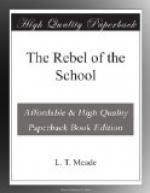“‘The gentleman part doesn’t matter,’ said our boy in reply to that; ’but I think, father, if you can give me my choice, I’d like best to be that which, if necessary, would oblige me to give my life,’
“‘What do you mean?’ asked his father, and the lad explained with his eyes shining.
“‘I have only got one life,’ he said, ’and I’d like to give it if necessary.’”
“To tell the truth, Ruth, I could not understand him.”
“But I can,” said Ruth. She hastily put down her porridge spoon and jumped to her feet. “I can understand,” she continued; “and I am proud of him.”
“So he went into the army. I wish you could have seen him in his uniform; and his father paid for every scrap of the whole thing, and educated him and all. Oh, dear! it was a proud moment. But we weren’t proud afterwards when we heard that he was killed. His father reminded me of his words: ’I’d like to be that for which I could give my life if necessary,’”
There was quite a pink color in each of Ruth’s cheeks now, and her eyes were very bright.
“I will go and see grandfather,” she said, “and then I must be off to school.”
She left the kitchen and went into the tiny parlor where the old man was seated. It was his fashion to get up early and go straight to the parlor and read or talk softly to himself. For a couple of months now he had never sat in the kitchen; he said it caused a buzzing in his head. Mrs. Craven brought him his meals into the little parlor. He had finished his breakfast when Ruth, in her neat Sunday dress, entered the room. There was an exalted feeling in her heart, caused by the narrative which her grandmother had told her of her father.
“Well, little woman,” said the old man, “and you are off to school? Or is it school? Perhaps it is Sunday morning and you are off to church.”
“No, grandfather; it is Saturday morning—quite a different thing.”
“Well, my love, I am as pleased as Punch about that school. I can’t tell you how I think about it, and love to feel that my own little lass is doing so well there. And if you get the scholarship, why, we will be made; we won’t have another care nor anxiety; we won’t have another wrinkle of trouble as long as we remain in the world.”
Ruth went straight over to the old man, knelt down by his side, and looked into his face.
“Stroke my hair, granddad,” she said.
He raised his trembling hand and placed it on her head.
“That is nice,” she said, and caught his hand as it went backwards and forwards over her silky black hair, and kissed it.
“Granddad,” she said after a pause, “is it the best thing—quite the best thing—always to come out on the right side of the ledger?”
“Eh? Listen to the little woman,” said the old man, much pleased and interested by her words. “Why, of course, Ruth; it is the only thing.”
“But does it mean sometimes, grandfather—dishonor?”




